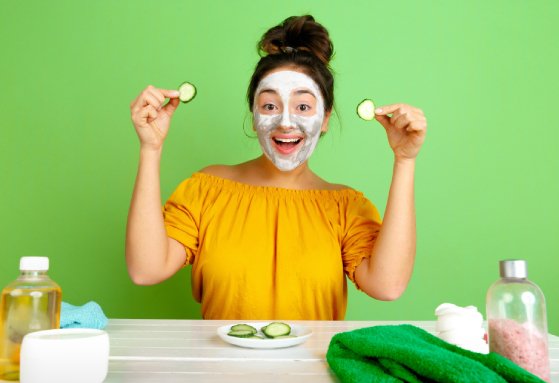DIY Beauty: Transform Your Skin with Simple Home Remedies

Date : 16 December 2023
Introduction
Welcome to the journey of achieving flawless skin through the natural route. In this guide, we'll explore DIY remedies recommended by the best dermatologist in Lucknow, offering you a holistic approach to skincare.
Understanding Your Skin:
Before diving into DIY remedies, it's crucial to understand your skin type. This knowledge will help tailor your skincare routine to address specific needs, ensuring optimal results.
Top DIY Remedies for Flawless Skin:
a. Cleansing and Exfoliation:
Start your skincare routine with gentle cleansing and
exfoliation. Remove impurities and dead skin cells to unveil
a fresh complexion.
How to:
Use a mild cleanser suitable for your skin type. Follow up
with a natural exfoliator, such as a sugar scrub, to gently
buff away dead skin cells.
b. Hydration Boosters:
Hydrated skin is the key to a radiant complexion. Incorporate DIY hydration boosters to nourish and moisturize your skin naturally.
How to:
Create a hydrating mask with ingredients like honey, yogurt, and aloe vera. Apply it weekly to replenish moisture and maintain skin elasticity.
c. Nutrient-Packed Masks:
Infuse your skin with essential nutrients using DIY masks. Customize recipes based on your skin's needs for a personalized skincare experience.
How to:
Experiment with masks using ingredients like avocado, turmeric, and oatmeal. These natural elements provide vitamins and antioxidants, promoting healthy skin.
4. Lifestyle Factors for Radiant Skin:
Achieving flawless skin extends beyond skincare routines. Embrace a healthy lifestyle by staying hydrated, getting enough sleep, and maintaining a balanced diet. These factors contribute significantly to your skin's overall well-being.
6. Additional Tips for Radiant Skin:
a. Sun Protection:
Shield your skin from harmful UV rays by applying natural sunscreens. Opt for hats and sunglasses to further protect against sun damage.
How to:
Create a DIY sunscreen using ingredients like coconut oil, zinc oxide, and shea butter. This provides a natural barrier without the chemicals found in commercial sunscreens.
b. Stress Management:
Manage stress to prevent skin issues. Practice mindfulness, meditation, or yoga to keep stress levels in check, promoting a healthy, glowing complexion.
How to:
Incorporate stress-reducing activities into your routine. Set aside time for meditation or engage in a calming hobby to promote overall well-being.
7. Regular Skin Assessments:
a. Know Your Skin's Changing Needs:
As seasons change, so do your skin's requirements. Adjust your skincare routine accordingly to accommodate shifts in weather and environmental conditions.
How to:
Regularly assess your skin's condition and adapt your skincare routine. Introduce or modify products based on changing needs to maintain optimal skin health.
8. Consistency Is Key:
a. Stick to Your Routine:
Consistency is crucial for visible results. Stick to your natural skincare routine, allowing time for the remedies to work their magic.
How to:
Create a realistic skincare schedule and stick to it. Consistency helps your skin adapt to the routine, enhancing the effectiveness of DIY remedies.
Community and Support:
a. Share Tips with Others:
Join skincare communities to exchange DIY tips and experiences. Sharing knowledge can provide additional insights and support on your skincare journey.
How to:
Participate in online forums or local skincare groups. Share your successes and learn from others' experiences to enhance your natural skincare routine.
10. Mindful Ingredient Selection:
a. Research and Understand Ingredients:
Be mindful of the ingredients you use in DIY remedies. Research their benefits and potential side effects to make informed choices for your unique skin needs.
How to:
Educate yourself on the properties of natural ingredients. Choose elements that align with your skin goals, ensuring a positive impact on your overall complexion.
Additional Tips for DIY Enthusiasts:
11. Patch Testing:
a. Test Before Full Application:
Before applying any new DIY remedy to your face, conduct a patch test to ensure your skin reacts positively and doesn't exhibit any adverse reactions.
How to:
Apply a small amount of the mixture to a discreet area, like behind your ear. Wait 24 hours to check for redness, irritation, or any other adverse effects.
12. Hygiene Matters:
a. Keep Tools and Ingredients Clean:
Maintain cleanliness to prevent bacterial contamination. Wash your hands, tools, and containers thoroughly before preparing and applying DIY skincare products.
How to:
Establish a routine of cleaning and sanitizing your skincare tools and containers. This simple step contributes to the effectiveness of your DIY remedies.
13. Professional Consultation:
a. Know When to Seek Professional Advice:
While DIY remedies can work wonders, it's essential to recognize when professional help is needed. Consult a dermatologist if you encounter persistent skin issues.
How to:
If DIY solutions don't yield desired results or if you experience unusual skin reactions, consult a dermatologist. They can provide personalized advice based on your skin's specific needs.
14. Holistic Skincare Approach:
a. Consider Internal Factors:
Remember, skincare isn't just about external treatments. Include a well-balanced diet rich in vitamins, minerals, and hydration for comprehensive skin health.
How to:
Incorporate fruits, vegetables, and water into your daily routine. A nourished body contributes to vibrant, flawless skin from the inside out.
Conclusion
Embark on your natural skincare journey with confidence. By incorporating DIY remedies and considering lifestyle factors, you're paving the way for radiant, flawless skin. Embrace the beauty of the natural route!

